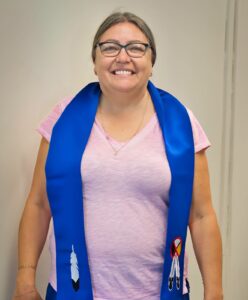#UofTGrad22: Q & A with ITR graduate Elma Arthurson
Categories: StudentsElma Arthurson received her Master of Social Work in FIFSW’s Indigenous Trauma and Resiliency field of study on November 10. In the Q&A below, she shares her experience as a student and plans for the future.
 What inspired you to apply to the ITR program?
What inspired you to apply to the ITR program?
I have spent 25 years in education and have taught in First Nations communities in Manitoba, British Columbia and in urban school divisions. Someone asked me recently, “Why a second master’s degree in social work, why not a Doctorate in education?” My response was simple: where else will I learn about trauma for Indigenous people? In the school system, I saw students and families with deep-rooted trauma that I could not recognize myself. This program was something that I searched for in the education field, and it is something that I feel is important to learn about. Maslow states that when the basic needs are not being met, then learning is difficult.
What impact has the program had on you?
The biggest impact the program has had on me was helping me recognize my own need to heal from the intergenerational trauma that I carried and thought was just a part of our culture. The learning that occurred internally was far greater than expected. I now view people, situations, and issues through an entirely different lens. Instead of asking, “what is wrong with you?” I ask, “what happened to you?”
As an educator, it is important for me to learn about our shared history, trauma, and resiliency. I have spent two-thirds of my life having a disconnect from my culture. My mother, two of my siblings, and my grandparents were attendees of the residential school system. I felt a disconnect that undermined my sense of self-worth and self-identity well into adulthood. I was drawn to ceremony, which gave me a stronger sense of identity, a stronger sense of my rights as an Indigenous person, and a stronger sense of responsibility to my culture, my children, and the importance of instilling pride in them. The ITR program is embedded with culture and Indigenous practices.
What are your plans after graduation?
My vision is to work in a trauma-informed organization that embraces diversity and creates a space for healing.
What advice do you have for new ITR students or those interested in applying to the program?
Prepare to go on a journey of healing. There will be challenging times but they are so worth it in the end. I have different lens to look through now.
Related:
- Charlotte Sampson-Elliott inspired by a goal to build trauma-informed schools in her community
- Terrance Lafromboise and Hyungu Kang reflect on the healing path they forged through FIFSW’s Indigenous Trauma and Resiliency field of study
- Q & A: Rebecca Schuss (MSW 2020) shares how her experience studying Indigenous Trauma and Resiliency at the Factor-Inwentash Faculty led to law school
- Alumna Julie Blair proves the power of U of T’s Indigenous Trauma and Resiliency program